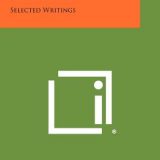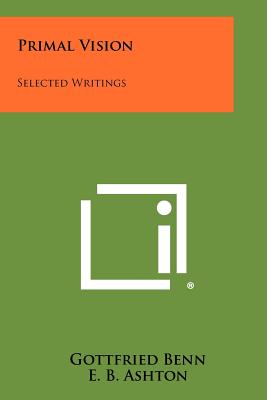Primal Vision – Gottfried Benn – 1971
Reviewed by: Michael Sympson Date: 2 September 2001
At present I am translating for an English publisher a collection of poetry and prose by Gottfried Benn. So I am familiar with “Primal Vision” or “Urgesicht.” It is one of the pieces I have excluded from my collection, and here is why: It is very hard to translate. As a linguist, I am not afraid of the sheer difficulty, but there is also an other aspect. Translating literature is not like translating for the United Nations. There are 2 major barriers: an unfamiliar language and unfamiliar conventions of style. The problem is to translate faithfully without producing something too outlandish to be acceptable for the English/American reader.
 Benn’s “Primal Vision” is hard to categorize – it is not a story, but it also is not explanatory prose for an essay. At best we should think of it as a verbal collage or a prose poem in Rimbaud’s vein. There is a line of thought behind it – or rather an obsession, one of Benn’s pet-hates. It is a powerful expression of the author’s disgust with the empirical realism of modern science (written by an extremely well trained scientist) and also expresses a for the time very common sentiment of disappointment with rationalism and Neo-Kantian idealism. Plenty of “-isms.” But none of this shows on the glittering surface created by one of the great linguistic geniuses in his language.
Benn’s “Primal Vision” is hard to categorize – it is not a story, but it also is not explanatory prose for an essay. At best we should think of it as a verbal collage or a prose poem in Rimbaud’s vein. There is a line of thought behind it – or rather an obsession, one of Benn’s pet-hates. It is a powerful expression of the author’s disgust with the empirical realism of modern science (written by an extremely well trained scientist) and also expresses a for the time very common sentiment of disappointment with rationalism and Neo-Kantian idealism. Plenty of “-isms.” But none of this shows on the glittering surface created by one of the great linguistic geniuses in his language.
Benn had a small but devoted following in France, way back in the nineteen twentieth. He was credited to be one of the 4 major poets of his time in the whole of Europe. In his own country he was less appreciated, but still acknowledged as one of the leading intellectuals before 1933. Then came Hitler and Benn fell into the trap of his own irrationalism. He had no particular sympathy for the leading figures of the Nazis, and he certainly was no anti-Semite, but he agreed on a particularly nasty point, little debated, if at all, that made him a Nazi-sympathizer even after 1945. Benn was a physician by profession, he had a profound understanding of genetics and at least since 1930 his work is laced with approving remarks on eugenic policies.
The result was his public commitment to the Nazis after 1933. However the new masters smelled a rat. Benn was too intellectual, to sharp, too much no nonsense for their taste; his publications before 1933 contained passages of what could be interpreted as “liberal” (read his essy on abortion) and lax on morals. Benn’s unflinching view on the facts of biological life earned him the denigration of a “pervert and sodomite.” As a doctor he was stricken from the list of practitioners entitled to write subscriptions under the national health insurance act – which was tantamount to professional suicide. As an author he was capable to publish until 1938; then censorship put an end to his literary career as well. Benn retreated into army service in the rank of a colonel of the medical corps.
After the war Benn regained part of his literary reputation, but he never recanted the views that made him commit his political boo-boo in the first place – a fact conveniently glossed over by his admirers. “Primal Vision” contains all the seeds and intellectual props which led to Benn’s downfall, but they are so thoroughly embedded in Benn’s brilliance of expression that it had passed unnoticed even in his own days. It is a brilliance that obscures the real issues under a veneer of an elitist but hollow art-philosophy which in its days had been influential for more than half a century. Benn was a great talent and the living example that even genius is no protection against error.















